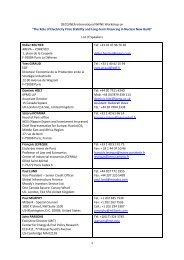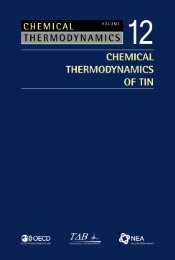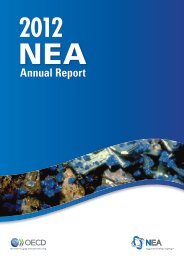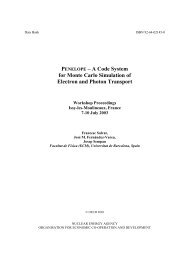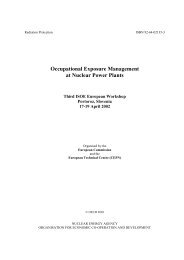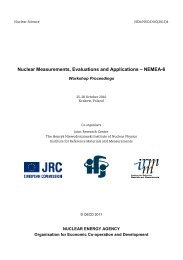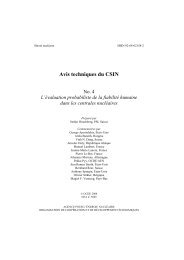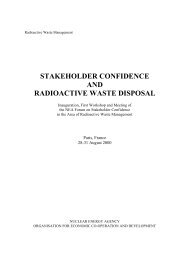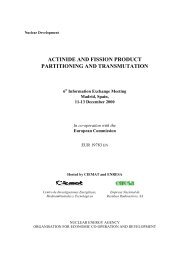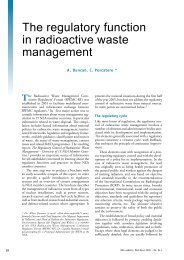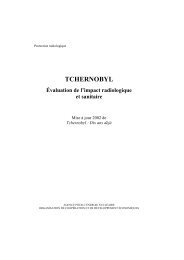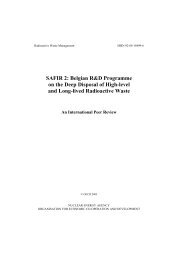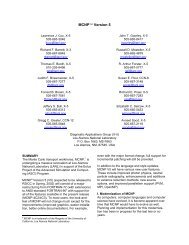COMPLETE DOCUMENT (1862 kb) - OECD Nuclear Energy Agency
COMPLETE DOCUMENT (1862 kb) - OECD Nuclear Energy Agency
COMPLETE DOCUMENT (1862 kb) - OECD Nuclear Energy Agency
You also want an ePaper? Increase the reach of your titles
YUMPU automatically turns print PDFs into web optimized ePapers that Google loves.
<strong>OECD</strong>/NEA programmes<br />
The <strong>OECD</strong>/NEA <strong>Nuclear</strong> Science Committee (NSC) started activities related to ADS and<br />
published a report describing different transmutation systems [129]. This report was followed by an<br />
international benchmark exercise to compare a specific fuel scenario, where MAs were recycled either<br />
through a PWR, a fast reactor or an accelerator-driven system [130]. In October 1998, the NSC<br />
organized a workshop in Japan on the “Utilization and Reliability of High Power Proton Accelerators”<br />
[131].<br />
The NSC is organizing a series of meetings on “Shielding Aspects of Accelerators and Irradiation<br />
Facilities (SATIF)”. The fourth meeting was held at Knoxville, TN, USA, in September 1998 [132].<br />
In addition, the NSC and the NEA Data Bank have activities of intercomparing the performance of<br />
computer codes [133-140] and have activities of evaluating intermediate energy nuclear data files<br />
[141,142], used for the modeling of ADS systems.<br />
IAEA programme<br />
IAEA published a status report [143] on accelerator-driven system to overview development<br />
activities and system concepts. A benchmark of sub-critical core (Stage 1) has been completed in the<br />
frame of the IAEA CRP on use of Th-based cycle in ADSs to incinerate Pu and to reduce long-term<br />
waste toxicities and results were reported to the Technical Committee Meeting on feasibility and<br />
Motivation for Hybrid Concepts for <strong>Nuclear</strong> <strong>Energy</strong> Generation and Transmutation, Madrid, Spain, 17-<br />
19 September 1997 [144].<br />
European Commission projects<br />
The impact of accelerator-based technologies on nuclear fission safety (IABAT) is being<br />
assessed by several research organisations of the European Union. The objectives of the project are to<br />
perform systems studies on ADS, to assess accelerator technology, to study the radiotoxicity of the fuel<br />
cycle and its non-proliferation aspects and to provide basic nuclear and material data useful for ADS<br />
[145].<br />
2.3.5 <strong>Nuclear</strong> data of minor actinides and long-lived fission products<br />
For the reactor transmutation studies, nuclear data libraries on the elements to be recycled<br />
were compiled from the JEF-1, then, more recently, the JEF-2 databanks. The JENDL Actinide File is<br />
being compiled in addition to the JENDL-3.2. It contains data on neutron-induced reaction for about 90<br />
nuclides from 208 Tl to 255 Fm.<br />
In the reactor transmutation studies on long-lived radioactive waste, nuclear data for MA<br />
nuclides and fission products are of primary importance. However, nuclear data for many MA nuclides<br />
are still not known with the desired accuracy. Accurate experimental data of neutron cross-sections for<br />
MAs are indispensable to establish MA transmutation technology by reactors. Accurate neutron<br />
cross-section data of RE nuclides become also necessary for designing the MA burning core. The data,<br />
however, are quite inadequate both in quality and in quantity.<br />
172



